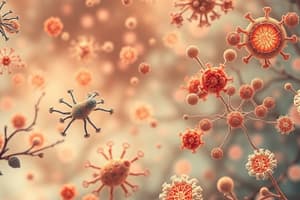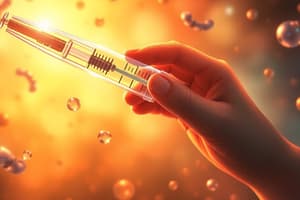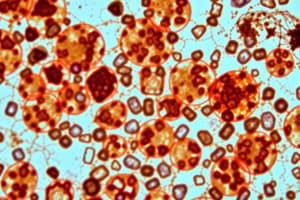Podcast
Questions and Answers
What is debridement?
What is debridement?
- The process of using maggots to clean wounds
- The process of applying topical creams to wounds
- The process of removing foreign material and dead tissue from wounds to facilitate healing (correct)
- The process of injecting antibodies into wounds
What are proteolytic enzymes used for in debridement?
What are proteolytic enzymes used for in debridement?
- To prevent infections from developing in wounds
- To promote the growth of new tissue in wounds
- To reduce inflammation in wounds
- To aid in the removal of foreign material and dead tissue from wounds (correct)
Which of the following is NOT a common microbial enzyme used for debridement?
Which of the following is NOT a common microbial enzyme used for debridement?
- Trypsin
- Papain
- Lipase (correct)
- Collagenase
What are antibodies, vaccines, and adjuvants collectively known as?
What are antibodies, vaccines, and adjuvants collectively known as?
What are polyclonal antibody preparations used for?
What are polyclonal antibody preparations used for?
What are the potential side effects of polyclonal antibody preparations?
What are the potential side effects of polyclonal antibody preparations?
What are monoclonal antibodies (mAbs) used for?
What are monoclonal antibodies (mAbs) used for?
What is Simulect used for?
What is Simulect used for?
What is the advantage of chimeric antibodies over murine antibodies?
What is the advantage of chimeric antibodies over murine antibodies?
What are humanized antibodies?
What are humanized antibodies?
What is Avastin used for?
What is Avastin used for?
What is the mechanism of action of Avastin?
What is the mechanism of action of Avastin?
What are antibody fragments?
What are antibody fragments?
Why are radiolabeled fragments better suited for diagnostic imaging purposes?
Why are radiolabeled fragments better suited for diagnostic imaging purposes?
What is Simulect used for?
What is Simulect used for?
What is the advantage of chimeric antibodies over murine antibodies?
What is the advantage of chimeric antibodies over murine antibodies?
What are humanized antibodies?
What are humanized antibodies?
What is Avastin used for?
What is Avastin used for?
What is the mechanism of action of Avastin?
What is the mechanism of action of Avastin?
What are antibody fragments?
What are antibody fragments?
Why are radiolabeled fragments better suited for diagnostic imaging purposes?
Why are radiolabeled fragments better suited for diagnostic imaging purposes?
What is the first FDA-approved recombinant subunit vaccine and when was it approved?
What is the first FDA-approved recombinant subunit vaccine and when was it approved?
What are the advantages of genetic engineering in vaccine production?
What are the advantages of genetic engineering in vaccine production?
What are the two main categories of mRNA vaccines?
What are the two main categories of mRNA vaccines?
What was the major disadvantage of hepatitis B vaccines produced from infected human plasma?
What was the major disadvantage of hepatitis B vaccines produced from infected human plasma?
What are the advantages of RNA vaccines?
What are the advantages of RNA vaccines?
What is the target animal of Porcilis PESTI and Bayovac CSF E2?
What is the target animal of Porcilis PESTI and Bayovac CSF E2?
What is the advantage of self-amplifying mRNA (saRNA) vaccines over conventional mRNA vaccines?
What is the advantage of self-amplifying mRNA (saRNA) vaccines over conventional mRNA vaccines?
Which of the following is NOT a category of traditional vaccine preparations?
Which of the following is NOT a category of traditional vaccine preparations?
What was the first FDA-approved recombinant subunit vaccine?
What was the first FDA-approved recombinant subunit vaccine?
What were the two major disadvantages of hepatitis B vaccines produced from infected human plasma?
What were the two major disadvantages of hepatitis B vaccines produced from infected human plasma?
Which group of biopharmaceuticals approved for animal use do Porcilis PESTI and Bayovac CSF E2 belong to?
Which group of biopharmaceuticals approved for animal use do Porcilis PESTI and Bayovac CSF E2 belong to?
What is the advantage of RNA vaccines over traditional vaccines?
What is the advantage of RNA vaccines over traditional vaccines?
Which type of mRNA vaccine exhibits enhanced antigen expression at lower doses compared to conventional mRNA?
Which type of mRNA vaccine exhibits enhanced antigen expression at lower doses compared to conventional mRNA?
What are the three in vivo RNA vaccine delivery methods mentioned in the text?
What are the three in vivo RNA vaccine delivery methods mentioned in the text?
Flashcards are hidden until you start studying
Study Notes
Biologics in Healthcare: Debridement, Antibodies, Vaccines and Adjuvants
- Debridement is the process of removing foreign material and dead tissue from wounds to facilitate healing.
- Proteolytic enzymes are used to aid in debridement, and can be applied topically in creams, ointments, or sprays.
- Common microbial enzymes used for debridement include collagenase, trypsin, and papain.
- Maggot saliva containing proteases can also be used to clean wounds.
- Antibodies, vaccines, and adjuvants are collectively known as biologics and have had a significant impact on healthcare management.
- Polyclonal antibody preparations have been used for passive immunization against infectious diseases and toxins for several decades.
- Antisera are antibody preparations obtained from animal sources, while immunoglobulin preparations are obtained from humans.
- Polyclonal antibody preparations can induce unwanted side effects, including hypersensitivity reactions.
- Monoclonal antibodies (mAbs) were first developed in the 1970s and are now widely used in diagnostic imaging and therapeutically for cancer, transplantation, and cardiovascular disease.
- mAbs can be conjugated to a radioisotope, drug, or toxin to deliver targeted treatment to specific cells in the body.
- Over 70 antibody-based products have gained FDA approval, including Remicade and Herceptin.
- Remicade is a chimeric mAb used to treat Crohn's disease, while Herceptin is a humanized antibody used for metastatic breast cancer.
Chimeric and Humanized Antibodies
- Simulect is a chimeric monoclonal antibody used for prophylaxis against acute organ rejection in allogeneic renal transplantation.
- Over half of all monoclonal antibodies are used for cancer detection/treatment.
- Murine monoclonal antibodies have limited therapeutic efficacy due to immunogenicity and HAMA response.
- Human antibody-producing lymphocytes can be rendered immortal by transformation or fusion with murine monoclonals or human lymphoblastoid cell lines, but these approaches are inefficient.
- Chimeric antibodies consist of mouse variable regions and human constant regions and are less immunogenic and display a prolonged serum half-life compared to murine antibodies.
- Clinical trials with chimeric antibodies have shown them to be generally safe and non-toxic, but repeated administration eventually raises the immune response in most recipients.
- Chimerization increases serum half-life by 5-fold and allows activation of Fc-mediated functions.
- Humanized antibodies transfer the nucleotide sequences coding for the CDR regions of the murine antibody into a human antibody gene, resulting in a hybrid antibody that is entirely human in nature except for the CDRs.
- Several humanized antibodies have gained market acceptance, such as Avastin, a recombinant humanized monoclonal IgG1 antibody used for first-line treatment of metastatic colorectal cancer.
- Avastin acts by inhibiting angiogenesis by binding to human vascular endothelial growth factor, preventing it from binding to its cell surface receptor.
- Antibody fragments such as F(ab), F(ab)2, and Fv are generated by recombinant DNA technology and are effective as therapeutics, but display greatly reduced half-lives and cannot initiate effector functions.
- Radiolabeled fragments may be better suited for diagnostic imaging purposes.
Overview of Traditional and Modern Vaccine Preparations
- Traditional vaccine preparations can be categorized into 6 groups, including live attenuated bacteria, dead or inactivated bacteria, inactivated virus, live attenuated viruses, toxoids, and pathogen-derived antigens.
- Recombinant DNA technology has enabled large-scale production of polypeptides from any pathogen, which can be used as subunit vaccines.
- Advantages of genetic engineering in vaccine production include clinically safe products produced by non-pathogenic hosts, unlimited supply, and consistent production of a defined product with fewer side effects.
- The first FDA-approved recombinant subunit vaccine was recombinant hepatitis B surface antigen (rHBsAg) in 1986, providing a clinically safe and unlimited supply of the vaccine.
- Prior to rHBsAg approval, hepatitis B vaccines were produced from infected human plasma, which had two major disadvantages: restricted vaccine supply and potential contamination with intact viable hepatitis B viral particles.
- In 1998, GSK secured FDA approval for Engerix B, a subunit vaccine containing purified rHBsAg, which is indicated for active immunization against all known serotypes of hepatitis B virus.
- Recombinant vaccines represent the largest group of biopharmaceuticals approved for animal use, with Porcilis PESTI and Bayovac CSF E2 targeting pigs.
- Peptide vaccines can be directly chemically synthesized and have been shown to confer immunological protection against viral and bacterial toxins.
- RNA vaccines elicit both humoral and cellular immune responses and were first approved for use against COVID-19 in December 2020.
- Advantages of RNA vaccines include easy design based on genetic sequencing, quick updates for emerging variants, inexpensive cell-free manufacture, non-infectious mRNA fragments, and flexibility to encode multiple viral proteins in a single vaccine.
- Two main categories of mRNA vaccines are conventional and self-amplifying mRNA (saRNA), with saRNA vaccines exhibiting enhanced antigen expression at lower doses compared to conventional mRNA.
- In vivo RNA vaccine delivery methods include lipid nanoparticles, electroporation, and needle-free jet injection.
Studying That Suits You
Use AI to generate personalized quizzes and flashcards to suit your learning preferences.




